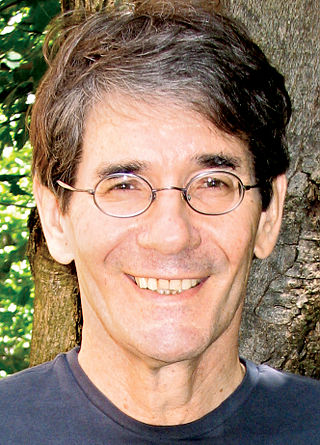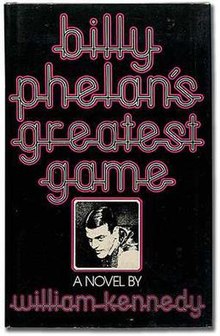
The Pulitzer Prize for Fiction is one of the seven American Pulitzer Prizes that are annually awarded for Letters, Drama, and Music. It recognizes distinguished fiction by an American author, preferably dealing with American life, published during the preceding calendar year.

Ironweed is a 1983 novel by American author William Kennedy. Ironweed received the 1984 Pulitzer Prize for Fiction and is the third book in Kennedy's Albany Cycle. It is included in the Western Canon of the critic Harold Bloom. The novel was adapted into a 1987 film of the same name.
William Joseph Kennedy is an American writer and journalist who won the 1984 Pulitzer Prize for his 1983 novel Ironweed.
Edwin G. "Ted" Burrows was a Distinguished Professor of History at Brooklyn College. He is the co-author of the Pulitzer Prize-winning Gotham: A History of New York City to 1898 (1998), and author of Forgotten Patriots: The Untold Story of American Prisoners During the Revolutionary War, (2008), which won the 2009 Fraunces Tavern Museum Book Award.
Daniel Patrick "Dan" O'Connell was a longtime leader of the Democratic Party political machine in Albany County, New York.
Francis Phelan is a fictional character in many of William J. Kennedy’s Albany novels, though he is featured most prominently in Ironweed. He is a former professional baseball player who left Albany in shame after dropping his infant son Gerald.

Michael Dirda is an American book critic, working for the Washington Post. He has been a Fulbright Fellow and won a Pulitzer Prize in 1993.

Ironweed is a 1987 American drama film directed by Héctor Babenco. Adapted to the screen by William Kennedy from his similarly named Pulitzer Prize-winning novel, Ironweed stars Jack Nicholson and Meryl Streep, with Carroll Baker, Michael O'Keefe, Diane Venora, Fred Gwynne, Nathan Lane, and Tom Waits in supporting roles. The story concerns the relationship of a homeless couple—Francis, an alcoholic, and Helen, a terminally ill woman—during the years following the Great Depression. Major portions of the film were shot on location in Albany, New York. The film received mixed reviews and was a box-office bomb, but Nicholson and Streep received Oscar nominations for Best Actor and Best Actress, respectively, for their performances.
Edward Martin Kingsbury was a journalist and reviewer who won a Pulitzer Prize for Editorial Writing.

Paul Herman Buck was an American historian. He won the Pulitzer Prize for History in 1938 and became the first Provost of Harvard University in 1945.
Roy Franklin Nichols was an American historian who won the 1949 Pulitzer Prize for History for The Disruption of American Democracy.

Claude Halstead Van Tyne was an American historian. He was a senior fellow at the University of Pennsylvania in 1902. He taught history at the University of Michigan from 1903 to 1930 and wrote several books on the American Revolution. He won the Pulitzer Prize for The War of Independence in 1930.
Frederic Lauriston Bullard was an American Christian minister and later an editorialist who won the 1927 Pulitzer Prize for Editorial Writing for his work in the Boston Herald entitled "We Submit", which argued for a retrial in the Sacco and Vanzetti case. He also wrote several books regarding Abraham Lincoln.

Edward Daniel Kuekes was an American editorial cartoonist. Working for the Cleveland, Ohio Plain Dealer, he won the 1953 Pulitzer Prize for Editorial Cartooning.
Elliot G. Jaspin is a Pulitzer Prize-winning American journalist.
Philip P. Kerby (1911–1993) was an American editorial writer who worked for the Los Angeles Times from 1971 to 1985. He won the Pulitzer Prize for editorial writing in 1976.
Mary Wells Knight Ashworth was an American historian who wrote for Douglas Southall Freeman between 1945 and 1953. With Freeman, Ashworth worked on his seven volume biography on George Washington. After Freeman died before his biography was completed, Ashworth continued completing the biography as a member of Charles Scribner's Sons from 1954 to 1957.
Thomas "Tom" Jeffrey Knudson is an American journalist and a two-time Pulitzer Prize winner in 1985 and 1992.
Patrick Joseph Sloyan was a Pulitzer Prize-winning journalist, known for reporting on the Gulf War during the 1990s and revealing deaths of American troops caused by friendly fire.

Grand View is the first produced play by Pulitzer Prize-winning author William Kennedy. Its world premiere was at Capital Repertory Theatre in Albany, NY, starring prolific television actor Robert Hogan.








